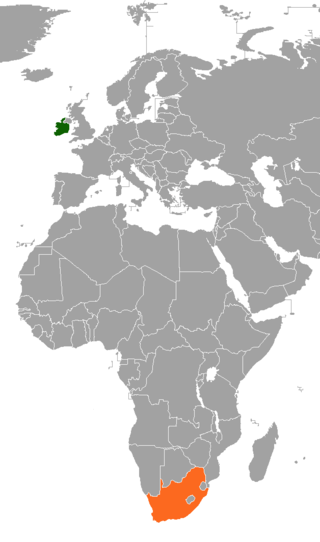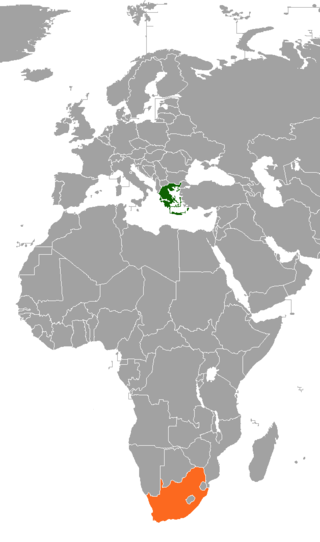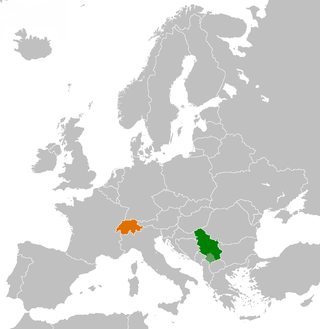The foreign relations of South Africa have spanned from the country's time as a Dominion of the British Empire to its isolationist policies under apartheid to its position as a responsible international actor taking a key role in Africa, particularly Southern Africa. South Africa is a member of the United Nations, the African Union and the Commonwealth of Nations. Considered a possible permanent addition to the United Nations Security Council, South Africa was elected in 2006, 2010 and 2018 by the UN General Assembly to serve on the Security Council. South African President Cyril Ramaphosa was the chair of the African Union from 2020 to 2021, the second time South Africa has chaired the organisation since its formation in 2003.

Switzerland is not a member state of the European Union (EU). It is associated with the Union through a series of bilateral treaties in which Switzerland has adopted various provisions of European Union law in order to participate in the Union's single market, without joining as a member state. Among Switzerland's neighbouring countries, all but one are EU member states.

Israel–South Africa relations refer to the current and historic relationship between the Republic of South Africa and the State of Israel. During the 1950s and 1960s, Israel became an open critic of the apartheid regime in South Africa, hoping to establish good relations with black-majority countries in Africa. However, most African countries severed ties with Israel in 1973 while increasing their ties with Arab countries. This situation led Israel to deepen its diplomatic ties with South Africa throughout the 1970s and 1980s. Up to 1986, Israel had a vibrant economic relationship but was forced to sanction South Africa in 1987, mainly as a consequence of American pressure.

There are 122 diplomatic missions in Hong Kong, of which 61 are consulates-general and 61 are consulates and six officially recognised bodies in Hong Kong. As Hong Kong has the status of a Special Administrative Region of the People's Republic of China, some consuls-general in Hong Kong report directly to their respective foreign ministries, rather than to their Embassies in Beijing.

Brazil–South Africa relations are the bilateral relations between the Federative Republic of Brazil and the Republic of South Africa. Both nations are members of the BRICS, Cairns Group, G20, Group of 24, Group of 77 and the United Nations.

The United States and South Africa currently maintain bilateral relations with one another. The United States and South Africa have been economically linked to one another since the late 18th century which has continued into the 21st century. United States and South Africa relations faced periods of strain throughout the 20th century due to the segregationist, white minority rule in South Africa, from 1948 to 1994. Following the end of apartheid in South Africa, the United States and South Africa have developed a strategically, politically, and economically beneficial relationship with one another and currently enjoy "cordial relations" despite "occasional strains". South Africa remains the United States' largest trading partner in Africa as of 2019.

There is a historical and current bilateral relationship between Ireland and South Africa. Both countries have established embassies in the territory of the other, in Dublin and Pretoria.

Egypt-South Africa relations are the bilateral relations between of Egypt and South Africa. The first South African mission in Egypt was established in 1942 as a Consulate-General. Egypt maintained diplomatic relations with South Africa until 1961.

The presence of a large Greek diaspora in South Africa led to the establishment of diplomatic relations as far back as the early 20th century. Relations are cordial and became stronger since World War II, during which both countries were allies. Greece has an embassy in Pretoria, a general consulate in Johannesburg and two consulates in Cape Town and Durban. South Africa has an embassy in Athens and an honorary consulate in Thessaloniki.

Egyptian-Swiss relations are the bilateral relations between Egypt and Switzerland. Official diplomatic relation between both countries date back from 1906, with the opening of a Swiss trade mission in Egypt.

Serbian-Swiss are foreign relations between Serbia and Switzerland. Both countries established diplomatic relations in 1916. Switzerland has an embassy in Belgrade. Serbia has an embassy in Bern and two general consulates.

Finnish-South African relations are foreign relations between Finland and South Africa. Diplomatic relations established May 15, 1949. A South African legation was established in 1967 and relations were then upgraded to ambassadorial level in March 1991. Finland has an embassy in Pretoria, a general consulate in Johannesburg and a consulate in Cape Town. South Africa is accredited to Finland from its embassy in Stockholm, Sweden.
A de facto embassy is an office or organisation that serves de facto as an embassy in the absence of normal or official diplomatic relations among countries, usually to represent nations which lack full diplomatic recognition, regions or dependencies of countries, or territories over which sovereignty is disputed. In some cases, diplomatic immunity and extraterritoriality may be granted.

South Africa–Taiwan relations, also before 1998: Republic of China–South Africa relations refers to the current and historical relationship between the Republic of China (Taiwan) and the Republic of South Africa. The Republic of China and South Africa established diplomatic ties in 1949.

Spain–Switzerland relations are the bilateral and diplomatic relations between these two countries. Both countries are members of the Council of Europe.














